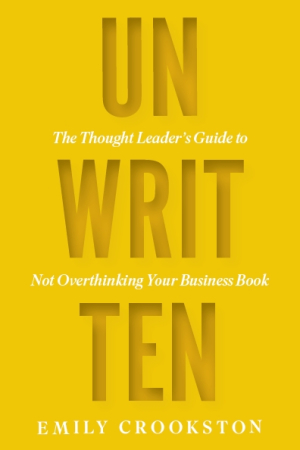Unwritten
The Thought Leader's Guide to Not Overthinking Your Business Book
- 2024 INDIES Winner
- Honorable Mention, Career (Adult Nonfiction)
A direct, encouraging guide to conceptualizing, writing, and publishing a business book, Unwritten walks aspiring writers through each step of the publishing process.
For fellow business book writers, ghostwriter Emily Crookston’s empowering guide Unwritten is about capturing what’s unique in one’s expertise to contribute to general knowledge bases.
About crafting and cultivating a fruitful “thought leadership ecosystem,” this book begins by analyzing how a prospective book might fit in and foster growth for other business leaders. After ensuring that one’s idea is worthy of a book, it covers how and where to start writing, the process of evaluating and nurturing an idea, an overview of common types of business books, and the processes of maintaining momentum, editing, and marketing. Its forward movement is methodical and consistent. There are notes on how to establish a schedule, meet one’s goals, and get over worrying about perfection during the editing process.
The guide is arranged in a way that mirrors Crookston’s own experiences as a ghostwriter—and, self-referentially, her experience of writing this book itself. It draws clear distinctions between ghostwriting and firsthand writing and delivers actionable advice for all steps in the process. With the idea that overplanning can lead to stagnation, it sets the goal of finishing a draft within sixteen weeks, encouraging aspiring authors with the example of a ghostwriting company whose writers do the same process in half that time. The book’s goals are made to seem achievable through concise, personable coverage of each of the steps along the way.
The book’s tone trends toward tough love, as with a section title in the chapter about feeling stuck or blocked: “You don’t need my permission not to write your book,” Crookston says, and follows this up with the blunt note that “if you don’t have a business case for your book, if it’s not the highest and best use of your time, then you shouldn’t write it. Period.” Balancing out these cautions are reminders at each step of the process that while writing can be difficult, the related challenges come with rewards. And levity factors into the book’s examples and encouragements, as with parenthetical song evocations and references to “Maude,” Crookston’s inner critic: “We can … have gratitude for our brain keeping us safe (thanks, Maude!) and tell ourselves that we’re going to do the thing anyway.”
An encouraging writing guide for those hoping to contribute their own works to the business genre, Unwritten is about advancing one’s business goals by publishing.
Reviewed by
John M. Murray
Disclosure: This article is not an endorsement, but a review. The publisher of this book provided free copies of the book and paid a small fee to have their book reviewed by a professional reviewer. Foreword Reviews and Clarion Reviews make no guarantee that the publisher will receive a positive review. Foreword Magazine, Inc. is disclosing this in accordance with the Federal Trade Commission’s 16 CFR, Part 255.

